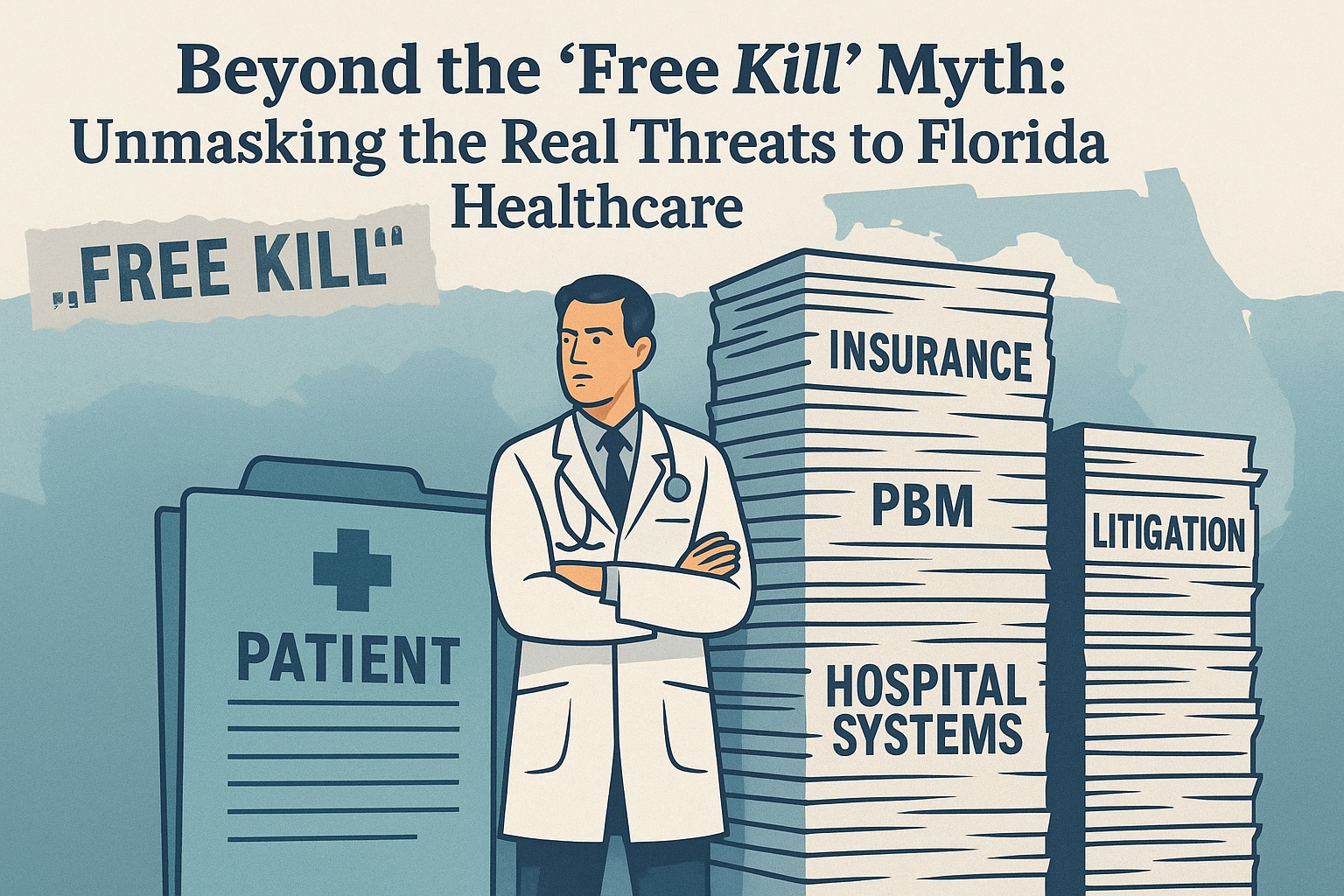3-Minute Read
The Debate Over “Free Kill”
Floridians deserve accountability when their healthcare falls short. That premise seems self-evident, so why the uproar over preserving—or repealing—the so-called “Free Kill” law? Enacted to make Florida more attractive to highly qualified physicians, the statute limits certain wrongful-death claims against individual doctors. Critics, particularly among the plaintiff-bar, recast it as a “license to kill,” implying that physicians can harm patients without consequence. The charge is inflammatory and ignores the reality of modern medical practice.
The Myth of Physician Impunity
No one denies that incompetent clinicians exist. Yet to suggest that physicians begin each day comforted by an alleged immunity is to misunderstand both the profession and the regulatory landscape. Doctors rank among the most scrutinized professionals in the country: State licensing boards, federal agencies, malpractice insurers, hospital credentialing committees, peer-review panels, and an exacting body of clinical guidelines all monitor their work. Far from operating with impunity, many physicians feel trapped in a defensive, protocol-driven environment that rewards conformity over clinical judgment.
How Bureaucracy Hurts Patients
Patients experience the fallout daily. How often have you been prescribed a drug you questioned because “that’s the protocol,” or watched your physician abandon a treatment recommendation because battling payors for authorization would consume hours better spent on care? These frustrations stem not from “free-killing” doctors but from an industrialized health-care system that penalizes individualized decision-making and squeezes professionals behind layers of bureaucracy.
The Scapegoat Strategy
Many try to scapegoat doctors for everything that ails healthcare. Some critics go further, marketing proposals such as a “three-strikes” rule—lose three malpractice suits and you lose your license—as if physicians were felons-in-waiting. This framing conditions the public to see every doctor as a potential criminal while diverting attention from the real power brokers who shape care.
Real Power—and Real Harm
Yet the public’s mistrust is not rooted in fear of physicians’ healing power; it is stoked by those who covet that power for themselves. Insurers, hospital conglomerates, pharmacy-benefit managers, and even litigators have steadily captured the levers of clinical authority—deciding which treatments are covered, setting reimbursement rates, and erecting policies that dictate care from afar while drafting protocols that override clinical judgment.
This consolidation has inflicted far greater, system-wide harm than individual physicians could ever cause collectively: Delayed interventions, rationed therapies, soaring costs, and a depersonalized patient experience that no malpractice verdict can rectify. Their consolidation of power has inflicted far greater system-wide harm than individual physicians could ever cause in the aggregate.
Our Stand
Florida Doctor Magazine does not ally with political parties; we ally with clinicians and their patients. We champion high-quality care, favorable outcomes, and professional autonomy—because healthier physicians deliver healthier Floridians. In that spirit, we support Governor Ron DeSantis’s veto of the bill to repeal the current statute. His decision is not a capitulation to physicians; it is a refusal to scapegoat them for systemic failures created by far larger, less accountable actors.








To the Editor,
I am writing in response to “The Debate Over ‘Free Kill'” in Florida Doctor Magazine. As a emeritus faculty member at a large medical school, a practicing OB/GYN, and a former Chief of Staff who oversaw a health system’s medical malpractice for 17 years, I approach this issue with a unique perspective grounded in both clinical practice and administrative oversight of patient safety and accountability.
While I appreciate the article’s defense of physicians and its critique of bureaucratic hurdles in healthcare, the stance taken by Florida Doctor Magazine in supporting Governor DeSantis’ veto of the “Free Kill” law repeal strikes me as deeply problematic. The premise that “Floridians deserve accountability when their healthcare falls short” is indeed self-evident, yet the existing statute actively undermines this principle for certain families.
The article contends that physicians are not “free-killing” and are highly scrutinized, which I largely agree with. My years in medical malpractice oversight demonstrated a robust system of checks and balances, including state licensing boards, hospital credentialing, and robust peer review. However, this oversight, while vital for professional standards, does not negate the need for a mechanism of redress when preventable harm leads to tragic loss. The “Free Kill” law creates an unjust hierarchy of human life, effectively telling adult children and certain parents that their grief and loss, when caused by medical negligence, are less worthy of non-economic compensation than if the death occurred through other forms of negligence or if they were a different age (e.g., 24 instead of 26).
Furthermore, Florida stands alone as the only state in the U.S. with this specific type of restriction on medical malpractice wrongful death claims. This singularity highlights the exceptional nature of a law that denies fundamental legal recourse to adult children over the age of 25 and to parents of adult children (age 25 or older) who are unmarried and have no children under 25, when their loved one dies due to medical negligence.
To assert that repealing this restriction would “scapegoat” physicians for systemic failures is, in my view, a misdirection. Accountability for individual instances of negligence is distinct from, though not unrelated to, the broader challenges of an industrialized healthcare system. While I share concerns about the influence of insurers, hospital conglomerates, and PBMs on clinical autonomy and patient care, these systemic issues do not excuse the need for individual accountability when medical errors lead to death. Allowing families to seek redress for non-economic damages is not an indictment of the entire medical profession; it is a fundamental aspect of justice for those most directly and tragically affected.
The argument that the law makes Florida “more attractive to highly qualified physicians” is questionable. I believe that most ethical, competent physicians are driven by a commitment to patient well-being and welcome appropriate accountability, not by legal protections that shield them from the full consequences of severe negligence. True professional autonomy, which the article champions, should be balanced with a commitment to comprehensive patient safety and when medical malpractice has occurred, appropriate accountability.
The veto of the repeal, supported by your publication, perpetuates a unique inequity in Florida law. It undermines the very idea that “Floridians deserve accountability” by selectively denying it based on the age or marital status of the deceased’s survivors. This is not about painting physicians as “felons-in-waiting”; it is about ensuring that all families have the opportunity for legal recourse when medical negligence leads to the ultimate loss, providing a measure of justice that transcends the complexities of healthcare economics.